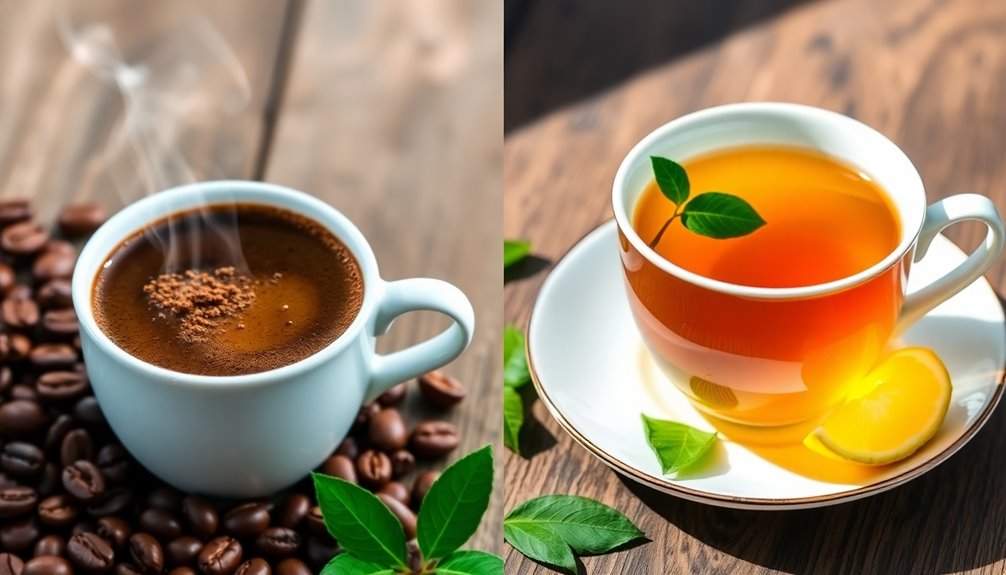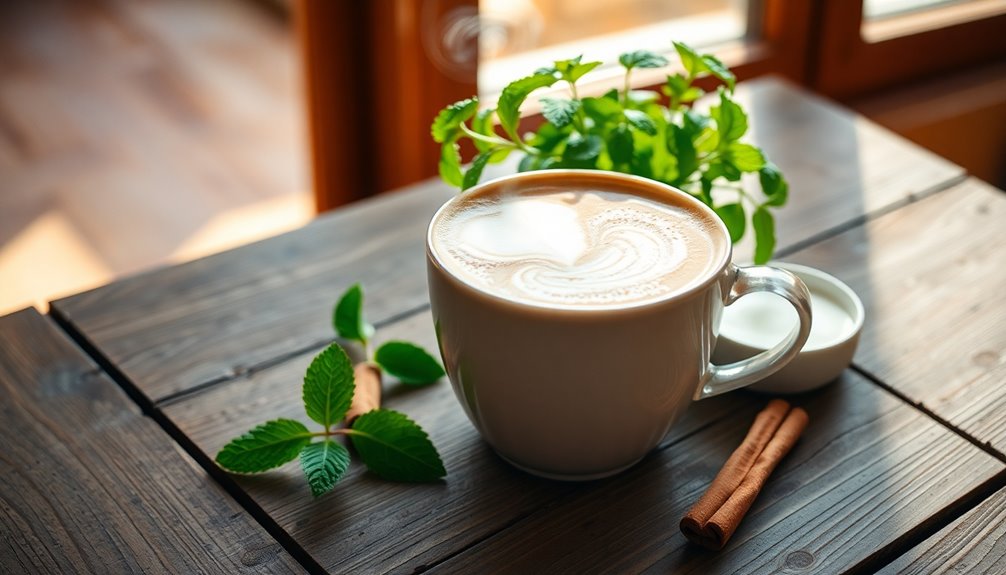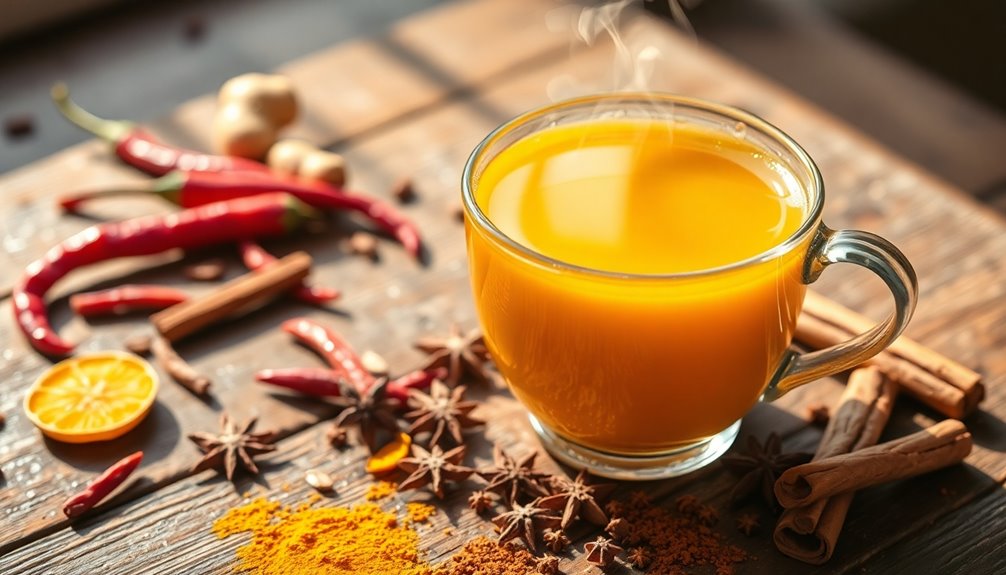When you weigh coffee against tea, both beverages have unique health perks and downsides. Coffee can lower your risk of Type 2 diabetes and boost antioxidant levels, but too much can lead to anxiety or sleep issues. On the other hand, tea supports heart health and can reduce anxiety with less caffeine. However, excessive tea might hinder iron absorption and increase kidney stone risks. Each drink has its merits, and knowing the pros and cons helps you make informed choices for your health. Keep exploring to discover how you can tailor these drinks to suit your lifestyle better.
Key Takeaways
- Coffee drinkers have a lower risk of Type 2 diabetes and cancer, while tea consumption enhances heart health and reduces mortality risk.
- Brewed coffee contains more caffeine than tea, which can lead to increased anxiety and sleep disturbances if consumed excessively.
- Coffee is rich in antioxidants and fiber, while tea provides catechins for cellular protection but lacks significant fiber.
- High tea consumption can interfere with iron absorption and increase kidney stone risk due to oxalates.
- Global tea consumption has risen among younger demographics, while coffee remains popular, especially in the U.S. and parts of Europe.
Health Benefits Overview
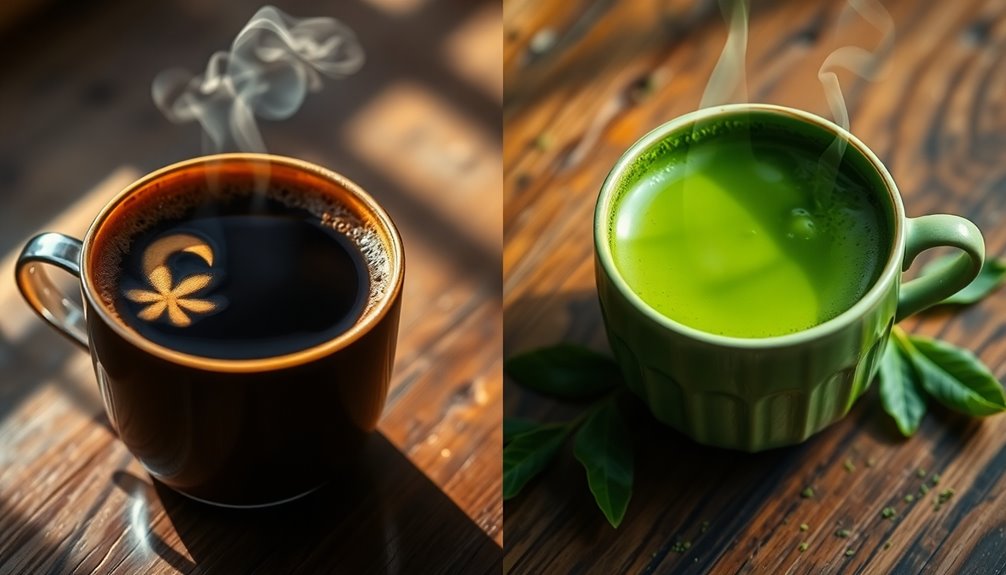
When you think about your daily cup of coffee or tea, you might be surprised to learn just how beneficial these beverages can be.
Both drinks are linked to lower risks of chronic diseases. For instance, coffee drinkers show a 25% lower risk of Type 2 diabetes and a 13% lower cancer risk compared to non-drinkers.
Regular tea consumption improves blood pressure and cholesterol levels, enhancing your heart health and longevity.
Coffee shines in liver health, reducing the risk of fatty liver disease by 23%.
Additionally, tea drinkers have a 9-13% lower risk of mortality over 14 years, while coffee drinkers enjoy a 30% lower likelihood of dying with a daily intake of 2.5-4.5 cups, thanks to their rich antioxidants.
Caffeine Comparison

Although both coffee and tea are popular sources of caffeine, their caffeine content varies considerably. Brewed coffee typically contains about 100 mg of caffeine per 8-ounce cup, while black tea holds around 50 mg. Here's a quick comparison:
| Beverage | Caffeine Content (mg per 8 oz) |
|---|---|
| Brewed Coffee | 80 – 140 |
| Black Tea | 40 – 120 |
| Green Tea | 20 – 45 |
| Herbal Tea | 0 – 10 |
Coffee may give you a quicker energy boost, but excessive intake can lead to side effects like jitteriness and insomnia. In contrast, moderate consumption of tea, especially green and black tea, offers health benefits like reduced anxiety and lower cortisol levels.
Antioxidants and Fiber

While both coffee and tea offer health benefits, their antioxidant profiles and fiber content set them apart.
Coffee is rich in antioxidants, boasting over 1,000 bioactive compounds, with chlorogenic acid being a significant contributor to its health benefits. This helps combat oxidative stress and may reduce the risk of chronic diseases.
In contrast, tea, especially green tea, is abundant in catechins like epigallocatechin gallate (EGCG), which also provide cellular protection.
When it comes to fiber, regular coffee consumption can contribute 1.1 to 1.8 grams per cup, supporting your daily intake.
Tea typically doesn't offer significant fiber unless you consume the leaves. Consequently, if fiber intake is a priority, coffee may be the better choice.
Risks and Drawbacks
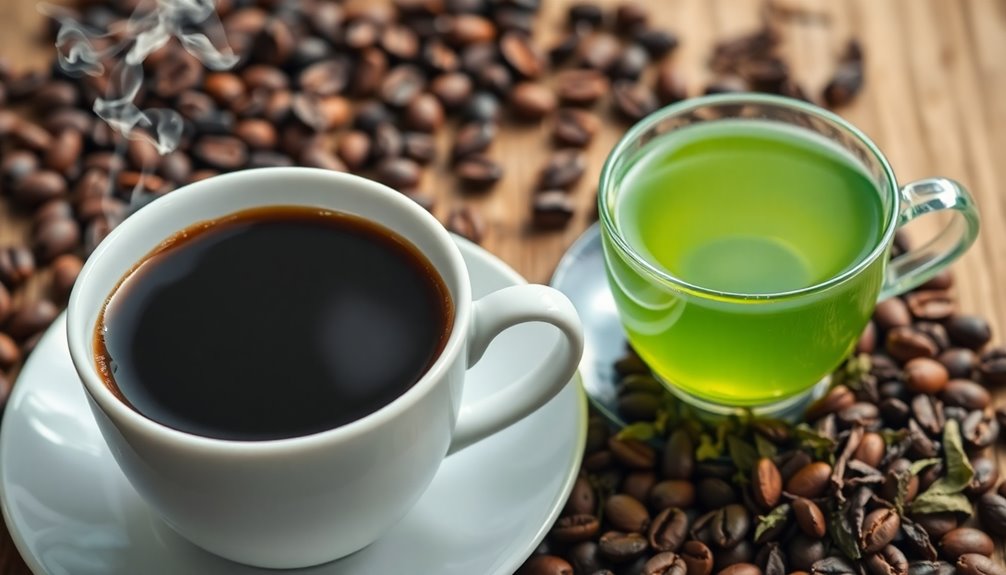
Both coffee and tea have their unique advantages, but it’s important to contemplate the potential risks and drawbacks associated with each. For example, coffee has been linked to improved cognitive function and a reduced risk of certain diseases. However, excessive consumption can lead to increased anxiety and disrupt sleep patterns. Similarly, while tea is high in antioxidants and can contribute to overall hydration, it may also lead to staining of the teeth and potential discomfort for those with acid reflux. It’s also worth considering the nutritional benefits of alternative milks, such as almond or oat milk, to be used in these beverages for added health benefits.
Excessive coffee consumption can lead to negative health effects like anxiety, heart palpitations, and sleep disturbances, especially due to its high caffeine content. While moderate coffee intake is generally safe, exceeding 400 mg of caffeine a day can complicate pregnancy and increase miscarriage risks.
On the other hand, high tea consumption may interfere with iron absorption, worsening anemia in those affected. Additionally, tea contains oxalates, which can raise the risk of kidney stone formation if consumed in excess.
Being mindful of these factors can help you enjoy these beverages without unintended consequences.
Global Consumption Trends
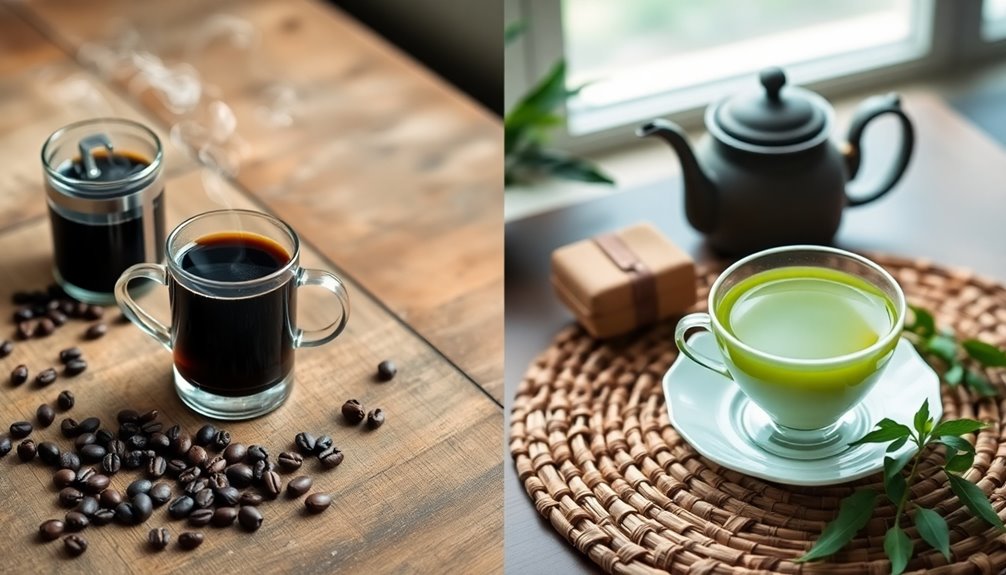
Global consumption trends reveal a fascinating landscape where tea outpaces coffee considerably. While coffee remains popular, especially in the United States, tea consumption is skyrocketing, particularly among younger demographics. In fact, tea is the second most consumed beverage globally, trailing only water.
| Country | Tea Consumption (%) | Coffee Consumption (%) |
|---|---|---|
| United States | 24.6 | 54 |
| United Kingdom | 78.4 | 21 |
| China | 98.9 | 1.1 |
| Global Average | 75 (est.) | 25 (est.) |
| Trend (2000-2023) | +20% (young adults) | N/A |
These statistics reflect not just beverage preferences but also the health benefits attributed to tea, underscoring a significant trend toward tea in various regions.
Frequently Asked Questions
What Has More Health Benefits, Coffee or Tea?
When you compare the health benefits of coffee and tea, both beverages offer unique advantages.
Coffee can lower your risk of Type 2 diabetes and cancer while enhancing alertness.
On the other hand, tea improves blood pressure and cholesterol levels, promoting heart health.
If you're looking for cognitive boosts, coffee's your choice, but for relaxation and anxiety reduction, tea's the winner.
Ultimately, it depends on what health benefits you prioritize.
What Are the Disadvantages of Drinking Coffee or Tea?
When you drink too much coffee or tea, you might face several disadvantages. Excessive coffee can lead to anxiety, insomnia, and digestive issues.
On the other hand, too much tea may interfere with iron absorption, especially if you have anemia. Both beverages can dehydrate you, so it's essential to manage your fluid intake.
Additionally, if you load them with sugar, you could negate their benefits and increase your risk of weight gain and chronic diseases.
What Are the Benefits as Well as Drawbacks From Caffeinated Drinks Such as Coffee and Tea?
Caffeinated drinks like coffee and tea offer both benefits and drawbacks. You might enjoy increased alertness and improved mood from moderate caffeine intake, while antioxidants in both beverages can boost your health.
However, too much caffeine can cause jitters, insomnia, and anxiety. If you're sensitive to caffeine, tea could provide a gentler option due to its L-theanine content, promoting relaxation.
Balance is key, so pay attention to how your body responds.
Is It Better to Not Drink Tea or Coffee?
Deciding whether to drink tea or coffee is like choosing between two paths in a forest; both can lead to benefits.
It's not necessary to avoid them entirely. Moderate consumption can offer health perks, such as antioxidants and lower disease risks.
However, if you're sensitive to caffeine, consider herbal teas or decaf options.
Ultimately, listen to your body and preferences; that'll guide you in making the right choice for your health.
Conclusion
In the grand debate of coffee versus tea, both beverages offer delightful perks and a few hidden quirks. While coffee gives you that invigorating boost, tea wraps you in a soothing embrace. Each has its unique charm, and the choice often boils down to your personal taste and lifestyle. So, whether you savor the boldness of a dark roast or the gentle caress of a chamomile brew, you're in for a flavorful journey worth exploring.
